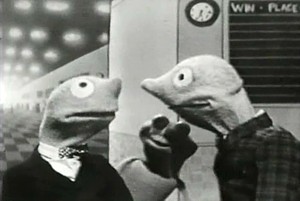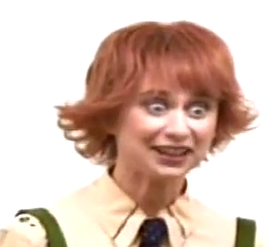http://www.bbcaustralia.com/penelopek/A jarring experience, to say the least. I was struck by the dark subtext of this particular BBC production. Here we have this woman, somewhere in her thirties, who has quite clearly been broken by the troubles of her life, and her ever-worsening mental illness. She is caught between the rampant creative energy flowing through her strained mind, and the social prejudice which is thrust upon her such that she feels that telling other people her name is necessary only as an afterthought (which is where the title of this series is derived). In the episode I saw, she spent several minutes speaking to a sock puppet on her right hand, and also went to a great effort to examine the facial expressions of a fish. And a rubber band sang to her. Let's go through these moments in order.
It should be noted that the sock puppet is named 'Squirm', and yet, he is a much stronger, more confident character than Penelope is. I believe that she is conveying her dream of what she wants to be, or wishes she could be, through the sock puppet on her right hand, but, held back by her evident schizophrenia, she is still tormented by the fact that she will never be adequate, and has named this charismatic being 'Squirm' in order to debase it. Perhaps if she can debase something so strong, she can finally be up to snuff with the bullies she has faced all her life.
Not that Squirm the Worm is without his weaknesses. He longs for eyebrows of his own; so much so that he has been collecting what can only be described as eyebrow wigs. Squirm reveals to Penelope K his collection, a collection filled with self loathing and regret. Even figments of Penelope K's imagination cannot escape her insecurities.

Next, she speaks to Hank and Frank, the fish. This is a meaningful scene. Penelope realizes that she is a deeply emotional and expressive being, but she finds it difficult to understand the people around her, and she conveys this through the fish, who, because they lack eyebrows, find it impossible to express themselves visually.
I could not find an image of these two fish. However, it should be noted that these are not the first duo named Hank and Frank.


The muppets seem to embolden the idea of this lack of expressiveness, to the point that they are almost disturbing to Penelope K. However, the connection to Jazz music opens up an entirely new avenue: Even though Penelope K cannot understand other people, she finds them beautiful, like clear, pleasant music on a warm summer's day. She wishes she could be one of them, but is consistently held back by her own inability to relate.
During this episode, Penelope K also races a shadow rabbit against a tortoise and listens to a rubber band sing. The rubber band helps to strengthen the idea that Penelope K loves music: perhaps it is one of the few artforms that she can appreciate in her condition, and the scene where she listens to Rubber Band sing is one of the most tender moments we've had on television in years. This is the moment where Penelope K is the most human.
This all culminates in Penelope K coming to terms with what she believes about emotion, at least partially. By relating to us how our eyebrows allow us to be expressive and prevents sweat from pouring into our eyes, she tells us in no uncertain terms what is important to her: She must always be able to share her joy of the world and its beauty, and must always be able to keep her eyes open, both literally and figuratively, to see it.
One of the darker elements of this show are the children, who frequently make appearances. Penelope K is extremely caught up in herself, and professes that her home - which is a mystery in and of itself but appears to be a home for specially abled people, or a mental asylum, or even just an extension of her dangerously vivid imagination - is an 'information center' where people can ask any question, and she will give them the correct answer. Every episode, a new child appears and asks her a question, which she invariably cannot answer and must research. What do the children represent on this show? Are they avatars of her own personality, much like Squirm or the fish? This would certainly add a certain element of development in Penelope K's persona, as the children are different and widely varied in gender, ethnicity, and personality traits. The one similarity they all have is that they all appear to be the same age, somewhere between seven and nine. Could this imply that Penelope K is constantly attempting to improve and change herself, but is always trapped in the mindset of a small child?
Another, more disturbing, possibility is that the children are real. Perhaps Penelope K is luring these children into her home, forcing them to endulge her in her neverending thirst for knowledge. I certainly hope these sorts of questions continue to be expanded upon in future episodes.
I have really been enjoying what I've been seeing so far. Amanda Bishop deserves much admiration for her role, as she evokes both an endearing innocence and a dreadfully disturbing glance at mental illness, at the same time. I also must give credit to the director and the writer: every shot has been meticulously crafted to draw us into this world of madness. It's great to finally see a good dramatic series on BBC.
Here is a short clip of some of what "Penelope K by the way" has to offer. I highly reccomend it to anybody looking for a good psychodrama, or even just something meaningful to watch in their spare time. Check your local listings for details. Here in Ontario, I catch it on TVO weekdays at 5:00 PM. One issue I have with this series is that my local station has this terrible habit of slotting a new episode every day, so if you want to catch every single one in order, you will have to be awake at 8:00 and 9:00 on Saturday and Sunday morning. The episodes seem to be able to stand on their own, so it's not so bad, but it can be jarring when we miss an entire episode about Squirm the Worm, and you miss out on some parts of his character.

--Simon Magnus

 Author
Topic: Penelope K, by the way (Read 4172 times)
Author
Topic: Penelope K, by the way (Read 4172 times)
